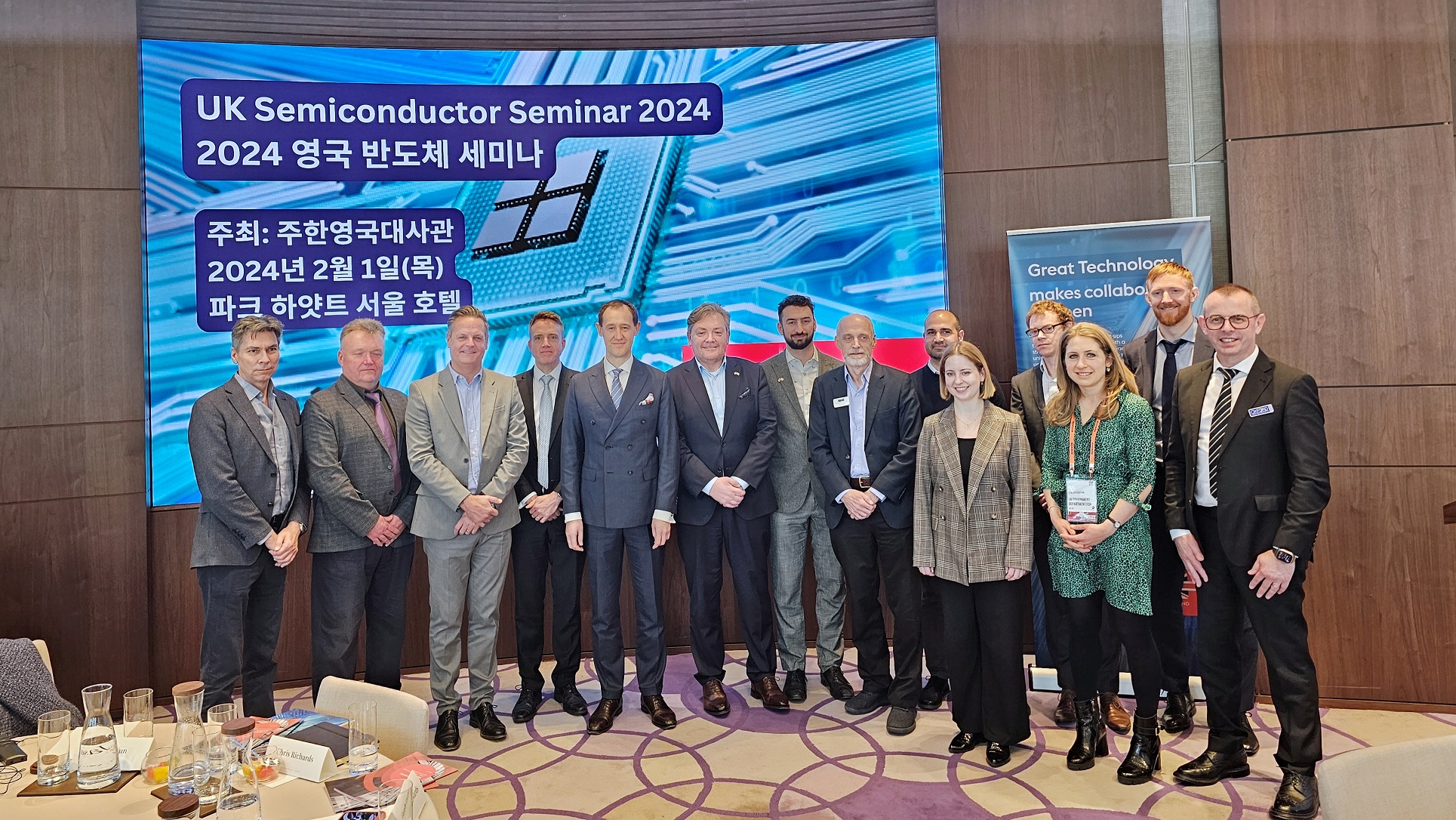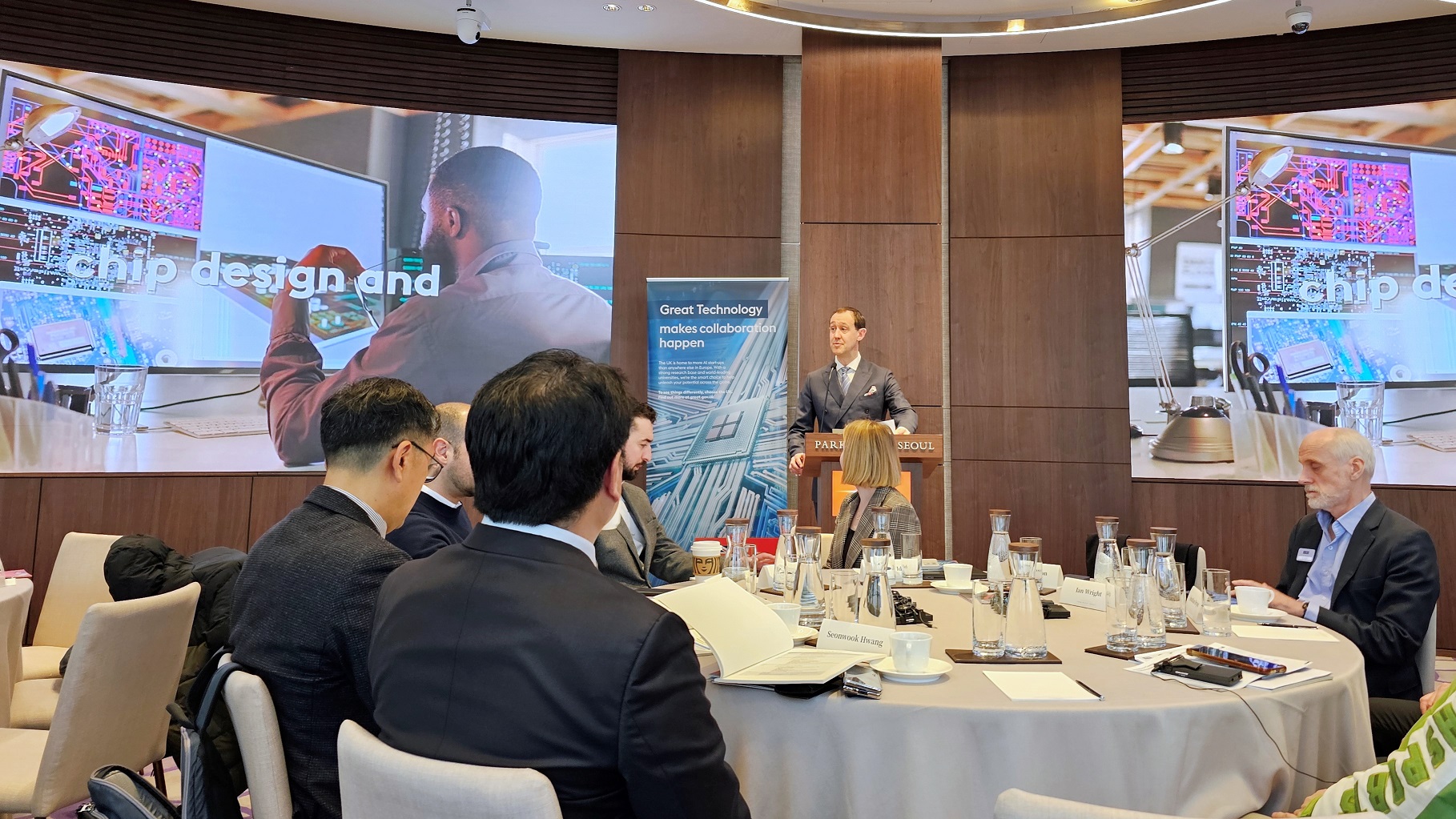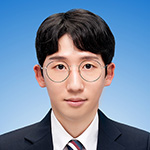英-韓, 반도체 맞손에 러브콜...영국 반도체 세미나 개최
기사입력 2024.02.01 16:08

▲주한영국대사관에서 주최한 영국 반도체 세미나에서 관계자와 세미나를 발표한 영국 반도체 기업 관계자들이 함께 모여 기념 사진을 찍은 모습
“한-영 반도체 프레임워크 시너지 창출 기대”
韓 제조 강점·英 설계와 R&D 강점 상호보완
韓 제조 강점·英 설계와 R&D 강점 상호보완
한국-영국 간 반도체 협력 강화를 도모하는 자리가 마련돼 영국 유수의 반도체 소재·장비·제조 기업들이 한자리에 모였다.
주한영국대사관이 주최한 영국 반도체 세미나가 1일 파크 하얏트 서울 호텔에서 개최했다.
영국산업통상부 관계자에 따르면 영국은 2023년 국가 반도체 전략을 발표해 반도체 기술 지원을 약속했다. 영국은 2023년부터 2년간 최대 2억파운드(한화로 약 3,300억원)를 지원하는 것에 더해 10년간 최대 10억파운드(약 1조7,000억원)의 투자 계획을 발표한 바 있다고 말했다.
특히 한국과 영국은 2023년 11월 반도체 협업 프레임워크에 합의했고 이러한 합의는 양자간 상호보완적인 기술 리더십에 기반하고 있다. 제조에 강한 한국 반도체 산업과 설계, IP, R&D 등 연구 분야에 강한 영국 반도체 산업의 결합이 큰 시너지 창출로 이어질 것이라고 관계자들은 기대했다.
영국 산업통상부 관계자 및 영국 유수 반도체 기업들이 참여한 이번 세미나에는 △Arm 코리아 △에드워드 코리아 △EpiValence △NPL △옥스포드인스트루먼츠 △Paragraf △Quinas Technology △Pragmatic Semiconductor △MCM Moisture Control&Measurement 등이 나와 발표했다.
황선욱 Arm 코리아 대표는 “Arm의 기술로 구현된 디바이스를 세계 인구 70%가 사용하고 있으며 2023년 한해에만 300억개 넘는 반도체 칩이 파트너사로부터 출하됐다”며 “Arm 기술은 스마트폰 혁명에서부터 시작돼 현재는 △오토모티브 △데이터센터 △IoT △AI △보안 등 영역을 확장하기 시작했다”고 말했다.
이외에도 △반도체 전공정에 들어가는 진공펌프의 세계적 기업인 에드워드 코리아 △ALD/CVD 전구물질을 생산하는 하이테크 산업 전문 기업 EpiValence △그래핀 기반 전자 디바이스를 대규모 생산하는 Paragraf △초저비용의 플렉시블IC 기반 RFID 및 NFC 칩을 제조하는 Pragmatic Semiconductor △양자 역학 프로세스 기반 비휘발성 및 D램의 속도 특성을 동시에 가진 울트라램을 연구·개발하고 상용화를 준비하는 QuInAs Ultraram 등이 자사 솔루션을 소개했다.

▲토니 클렘슨 주한영국대사관 산업통상부 참사관 영국 반도체 산업 특성에 대해 소개하고 있다.
토니 클렘슨 주한영국대사관 산업통상부 참사관은 “영국 정부는 반도체 기술이 경제와 안보에 중요한 역할을 담당하고 있다는 것을 인식해 반도체 글로벌 리더인 한국과의 협력 강화를 도모하고자 이 자리를 마련했다”며 “영국 반도체 산업은 △설계 △화합물 반도체 △R&D △IP 등에서 강점을 가진다”고 강조했다.
최근 한국-영국 간의 양자 프레임워크를 체결해 경제협력의 파트너로 자리매김했음을 언급하며 “양국 반도체 연구개발 및 협력을 강화하고 양국 기업이 함께 협업하는 기회가 약속되길 바란다”고 밝혔다.
한편, 영국의 반도체 클러스터는 △사우스웨일스(화합물 반도체) △케임브리지(Arm 본사, 대학 및 연구단지 밀집) △브리스톨(팹리스) △스코틀랜드(포토닉스, 화합물 반도체, 시제품 설계) △북동부(신소재 및 화합물 반도체) 5곳에 집중하고 있는 것으로 전해졌다.
많이 본 뉴스
[열린보도원칙] 당 매체는 독자와 취재원 등 뉴스이용자의 권리 보장을 위해 반론이나 정정보도, 추후보도를 요청할 수 있는 창구를 열어두고 있음을 알려드립니다.
고충처리인 장은성 070-4699-5321 , news@e4ds.com









